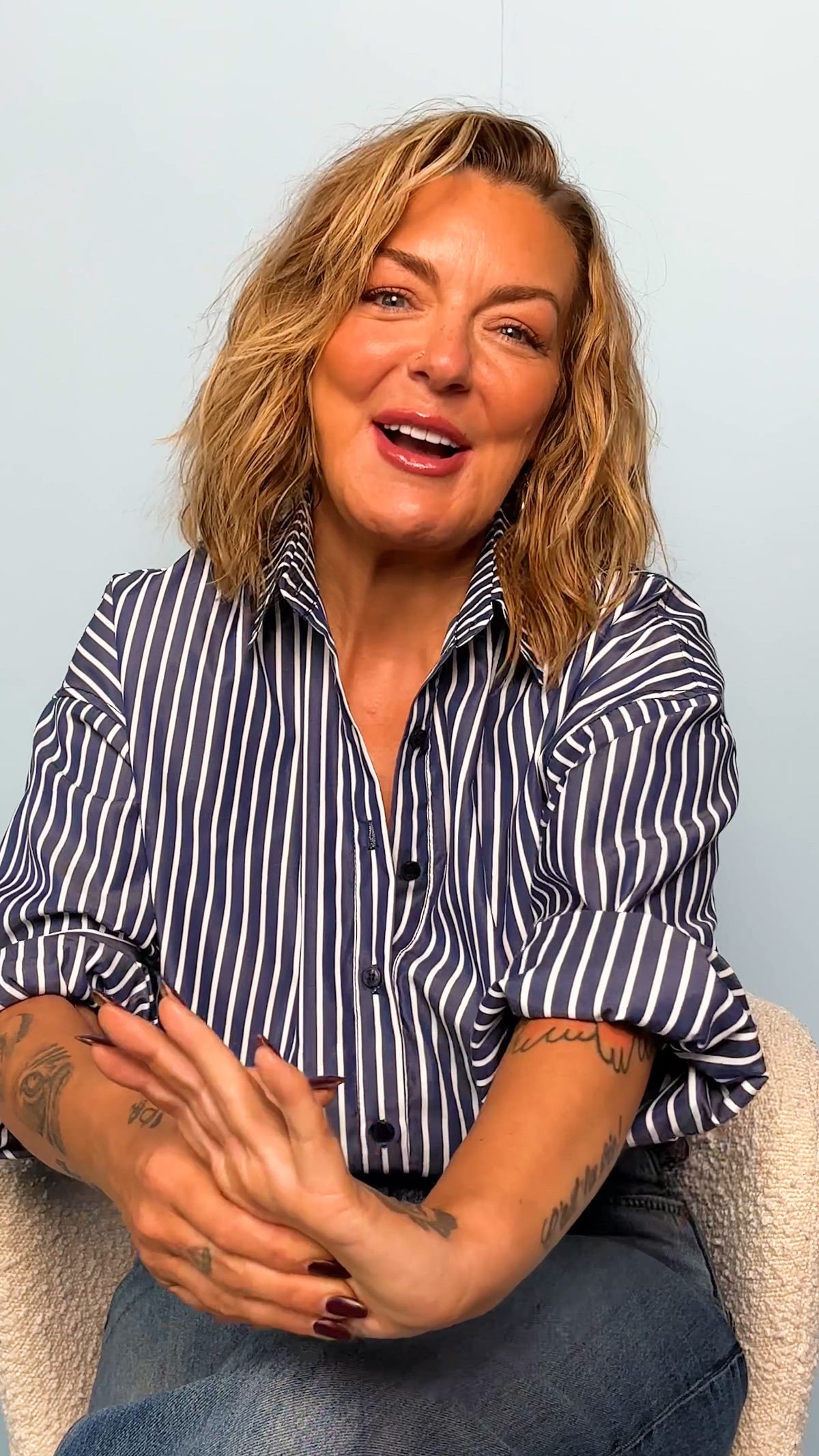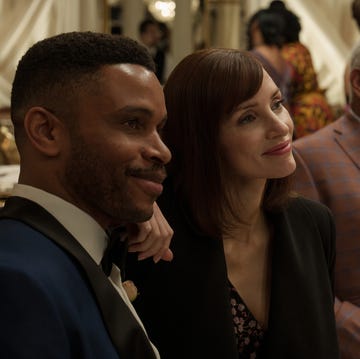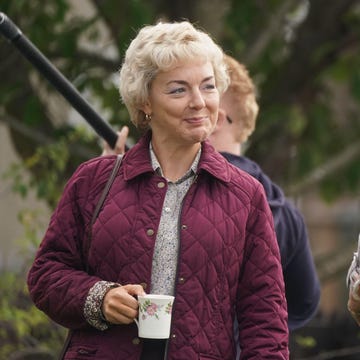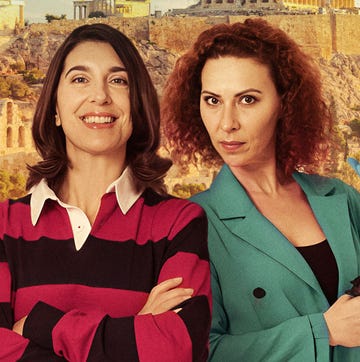Teenage diaries are riddled with bias, hormones and historical inaccuracies, but if there was one consistent theme in mine, it was that if I had big breasts, my life would be golden. In one entry, I refer to mine as ‘peas in a stocking’ and believed that ‘no one will marry me
if I look like this.’
One by one, other body parts are itemised, analysed and criticised. It’s clear that my perception of who I was utterly wrapped up in how I looked. There was no mention of the qualities my school friends – who I’m still close with today – swear they saw and valued in me back then: kindness and loyalty.
I tell this story because it highlights the enormous gulf between how we see ourselves and how other people may see us: something that’s been captured in Good Housekeeping’s new landmark research. Nearly 3,000 women, across all the adult generations, were surveyed. We all have lots in common. For example: regardless of age, almost half of us often say or think negative things about our appearance. In fact, only one in three of us is content with our body, and only one in 10 feels proud of it.
This self-criticism is worse for younger women, but no age group is exempt. Whatever our age, we look in the mirror and struggle to see past our supposed physical flaws. But here’s the irony. When it comes to qualities respondents said they admired in other women, beauty was the least important. Kindness, integrity and confidence were identified as being the most important. So why is it so hard for us to see and value ourselves as others do?
Early influences
My warped body image was formed, in part, by listening to how the women around me talked about their own bodies when I was a child – the countless refrains of ‘I just need to lose two kilograms, then I’ll look great’, issued by my mother’s generation.
I heard them say it in their 40s, when I was too small for my own body to be commented on, and they’re still saying it in their 70s and 80s. It occurs to me that it will never end, and they’ll probably die still wishing they could lose a few pounds.
At school, around the age of 15 to 16, I remember skipping breakfast because I wanted my stomach to look flat, and if I could skip lunch as well, that was a bonus. A few years later, at university, I visited a friend’s house. Her uncle had just died. I couldn’t believe my ears when my friend’s mother said: ‘It’s been an awful time and I haven’t been able to eat, but at least the upside is that I’ve shed a few kilograms.’
These early influences tamper with our body image circuitry. It leaves us either in a permanent state of dissatisfaction with our bodies, because our expectations are unrealistic, or with the belief that our bodies say something about who we are and the value we hold as a person.
Turning points
‘Now I’m in my 40s, I still observe this a lot of the time when women get together: who’s wearing what, who wants to lose weight, who feels they look old, who’s having Botox etc,’ says Elizabeth Davies, fitness coach and owner of This Woman Lifts. ‘When the focus is so heavily tilted towards physical appearance, it gives body image an inflated status.’
My own turning point occurred in my late 30s, when I began weightlifting. For me, physical activity had always been synonymous with weight loss, but I started doing it
just to get physically strong. As I grew stronger, the motivation simply to be able to do more grew increasingly satisfying, until it overtook weight loss and maintenance as a goal. Gradually, it shifted the centre of gravity from what my body looked like to what it could do.
It made me more confident, more able to take up physical space on the street, the bus,
a boardroom. And this is the thing – we don’t realise how much chasing thinness forces us to shrink and cower in every single aspect of our lives, until we replace it with a better, more fulfilling goal. Although it took time and a lot of self-reassurance, the goal to be physically stronger literally liberated me from chasing some impossible body image standard.
Over the last five years, there’s been a growing focus on, and awareness of, the fact that health isn’t about the size of your body. This is largely due to the body positivity movement led by influencers and activists, as well as the body neutrality movement and the emergence of anti-diet culture into the mainstream.
Yet in the world outside of my weightlifting gym, the belief that thin is best is every bit as powerful as it ever was. Overall, body diversity has declined on the Fashion Week catwalks in recent years.
Look at any photo of celebrities on a red carpet and it’s clear: hyper-thin bodies are, once again, the ultimate prize. Were they ever not?
So where does that leave us? Is there no way to unpeg our self-worth from our dress size, the smoothness of our skin and the silkiness of our hair? Must the next generation inherit our hang-ups?
While I don’t have children, the idea of my 10-year-old niece, Leela, suffering the body image issues that plagued my generation fills me with dread. I’m not alone.
‘The main challenge around body image for younger generations is that they’ve lost the concept of what bodies actually look like,’ body confidence coach Michelle Elman explains. ‘Filters, Photoshop, editing and even improved technology, with AI and knowledge about the best lighting for appearance, have amplified how much they’re comparing their own human skin – with pores and imperfections – with the airbrushed and digitally altered content we see online.’
GH’s survey shows that the issue older generations most want to solve for Gen Alpha is the mental health crisis. Changing the way we talk about ourselves and others is vital if we want to finally break the body image mould for the next generation, says psychologist and behavioural change specialist Shahroo Izadi. ‘We should celebrate [positive] traits rather than commenting on appearance,’ she says. ‘This helps young people see that what makes us love and respect others has little to do with body size.’
Changing the narrative
That may be easy enough when talking about other women. But how can you rewrite a lifetime of negative thoughts about your own body? Elizabeth Davies recommends making a conscious effort to talk and think about your body’s abilities, not its appearance. ‘My body is for doing,’ she says. ‘It’s not there for decoration.
It can do all kinds of brilliant things: carry me on long walks, lift heavy things, renovate a house, lug compost around the garden, chase [my kids] and wrestle them and carry them. Those are the things I’ll comment on.’
Shahroo recommends a self-compassion exercise that she uses with clients. ‘I’ve learned in my work that many people are shocked to discover just how unkind their inner voice can be. Even more surprising is how often this self-talk doesn’t align with the way they’d speak to anyone else.’
She suggests writing down the name of someone you love, picturing them being self-critical, then writing encouraging words you’d say to them to uplift them. Then reflect on your own inner voice and compare these supportive words with the ones you use on yourself. Or go further still: pick up the phone and ask a friend how she sees you. Write her words down and do the same for her.
‘Let this act as a visual guide and reminder of what you know to be kind, fair and effective,’ says Shahroo. ‘The good news is that once you curiously, companionably notice and question these inner messages, you can start to debate with and update the soundtrack to
one that’s kinder, fairer and more helpful.’
I think back to when I had bad body image and I think about the friends of mine who still do. One of the biggest tragedies is the time we wasted in criticising ourselves – time we’ll never get back. The energy spent trying to win a game that’s rigged. But if we want to change it, we have to start somewhere. Kindness in how we talk to ourselves seems like a good place to start.
Could you see yourself through your friend's eyes?
As Poorna Bell’s close friend, and author of the book Ugly: Why The World Became Beauty-Obsessed And How To Break Free (Blink), there’s no one better than Anita Bhagwandas to try Good Housekeeping’s body image challenge.
We sent the writers to a studio together to be photographed in their gym kit, then tell us – honestly – what they thought when they looked back at the resulting portraits. What did they see when they looked at their own bodies? And how did that compare with what their friend saw? Perhaps most importantly, can hearing their views change our own?
Poorna says...
Anita (above) looks so stunning – her hair, her skin! It’s giving goddess. Which is unsurprising given that she’s always carved a unique path in her line of work in the beauty industry as a South Asian woman, when there were very few of us around. That drive to push against the status quo radiates through the confident way she looks straight at the camera. I see someone who embodies being unequivocally herself, someone who’s creative and artistic and sees their body as something to be adorned and appreciated. It makes me proud to be her friend.
When I look at my photo (below), I hate that my eyes race to check my midriff and chin. Once I quieten the negative train of thought, I think: I actually quite like my legs and I can see that I carry myself in a confident way. But there’s always a part of myself wondering if I’m faking that positivity. This whole exercise makes me want to try better, to break free of that small-minded mentality. I don’t want to keep doing this until my old age – there are better things to focus on, surely?
Anita says...
When I see Poorna (above) in this picture, I see a strong woman who’s overcome so much and embraces every part of their journey with grace. I love that her tattoos nod to her South Asian heritage. Her friendly gaze at the camera shows somebody who’s confident and happy with themselves. But beyond that, Poorna really is a role model for those who haven’t followed that traditional journey in life. To me, this picture really embodies that; she’s the ultimate rebel and I love that you can see glimpses of that from the glint in her eye.
I never would have been able to say this 10 years ago, but I’m okay with how I look in my photo (above). I never thought I’d get here – to a place of self-acceptance and relative neutrality; maybe that shows how far I’ve come. Sure, I did feel a little out of my comfort zone, but instead of focusing on the flaws, I can finally appreciate my muscular legs and my intentions to build physical strength. To have this reminder of how Poorna sees me has been so uplifting. I’m vowing to do this more for all my friends.














![©ITV from monumental television frauds sr1pictured: jodie whittaker as sam suranne jones as bert this photograph is (c) itv plc/ monumental television and can only be reproduced for editorial purposes directly in connection with the programme or event mentioned above, or itv plc. this photograph must not be manipulated [excluding basic cropping] in a manner which alters the visual appearance of the person photographed deemed detrimental or inappropriate by itv plc picture desk. this photograph must not be syndicated to any other company, publication or website, or permanently archived, without the express written permission of itv picture desk. full terms and conditions are available on the website www.itv.com/presscentre/itvpictures/termsfor further information please contact:michael.taiwo1@itv.com](https://hips.hearstapps.com/hmg-prod/images/frauds-sr1-first-look-03-6891d81c2d536.jpg?crop=0.428xw:0.643xh;0.0641xw,0.116xh&resize=360:*)


